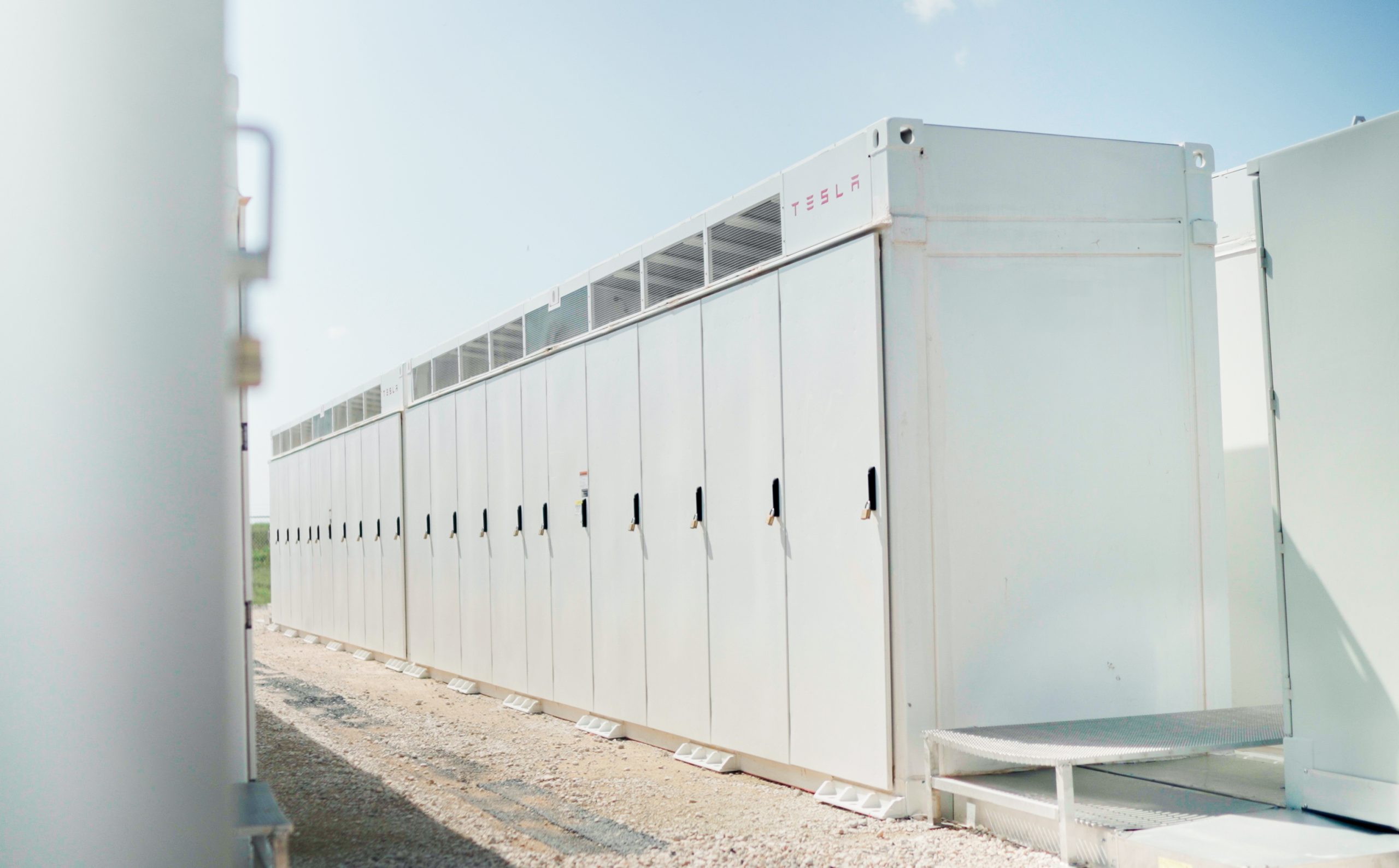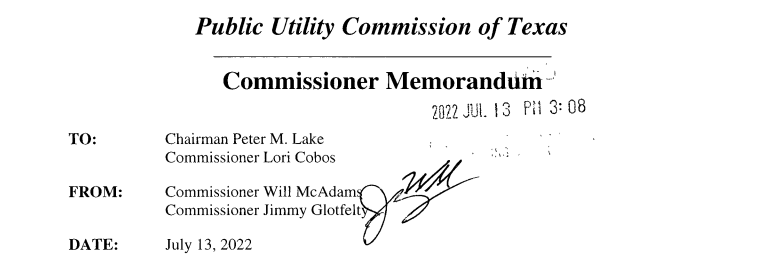A few days ago, the Texas Public Utility Commission (PUC) said that it was creating a memo to address issues that Commissioner McAdams touched upon in the July 11 workshop. To recap, Tesla Energy has been working with the PUC and the Electric Reliability Council of Texas (ERCOT).
The focus is on educating the utility and the commission about the benefits of allowing Tesla Powerwall customers in Texas to participate in virtual power plants (VPPs).
Tesla’s U.S. Energy Markets Policy Lead, Arushi Sharma Frank has been present at every meeting and has been working diligently to advocate for clean energy and Tesla Energy’s Texas customers.
The Memo
The previously mentioned future memo addresses some of the issues that Commissioner McAdams brought up in the July 11 workshop. He and Commissioner Glotfelty co-authored the memo.
The memo reads as follows:
As discussed during the June 16, 2022, Open Meeting and July 11, 2022, Aggregated Distributed Energy Resources (DER) Pilot Workshop, we support efforts to create a pilot project to test impacts of small-scale DER aggregation in the ERCOT market.
The pilot will answer questions related to how aggregated distributed generation can support reliability, enhance the wholesale market, incentivize investment, potentially reduce transmission and distribution investments, and support better load management during emergencies.
In the short term, we expect the pilot will bring in vital megawatts (MWs) of resources for participation in the ERCOT market.
ERCOT staff are required to prepare and present a governing document detailing the project scope to ERCOT’s board of directors.
The PUC will form a Task Force to identify operational obstacles to launching a pilot program and to assist ERCOT in drafting the governing document.
The next meeting to discuss the purpose and structure of the Task Force will be held on July 28, 2022. The governing document should be presented to the ERCOT board by October 11, 2022, so that it can meet a desired pilot start in the first quarter of 2023.
The Guiding Principles
The memo included five guiding principles that the commissioners want the pilot project to consider. They are:
- Understand the impact of having ancillary services carried on the distribution system.
- Create a structure that incentivizes competition and attracts broad DER participation through load-serving entities (LSEs).
- Measure the impacts of relieving or causing congestion on the distribution system, and study how to transition distribution-level aggregations to more granular dispatch and settlement.
- Ensure adequate customer protection is in place and information is anonymized.
- Start simple while ensuring economies of scale exist on a MW [megawatt] basis to attract broad participation. The pilot parameters should have the flexibility to progress to more complex scenarios as participation increases.
Project Scope.
This next section of the memo addresses the governing document that shares the project scope with ERCOT’s board of directors. These topics are scale, duration, transmission and distribution utilities participation, interchange of customers, and reliability.
The following is from the memo detailing each topic:
- Scale – Aggregations should be constrained within a load zone, with a single LSE, and served by the same transmission and distribution service provider (TDSP) with the potential for DER Management Systems (DERMS) aggregators to participate in the future. Participating TDSPs may limit pilot area based on feeder availability and information provided by LSEs related to their DER customers.
- Duration – The pilot should continue until implementation of ERCOT market rules to accommodate aggregation or until ERCOT deems the pilot project unnecessary. We expect a minimum of 3 years which will allow for incorporation of EMS upgrades, testing of customer migration, and qualifying resources for ERCOT services.
- TDSP Participation – It is imperative that competitive area transmission and distribution utilities (TDUs) and non-opt-in entities (NOIEs) participating in the pilot are willing participants and actively engaged to ensure safety and quality of experience to their customers. We expect reliability to be the ultimate consideration by TDSPs for qualifying DER customers.
- Interchange of Customers – The acquisition of customers should be handled by the LSE with terms and conditions to provide relevant operational data and a good customer experience that prioritizes affordability and reliability.
- Reliability – TDSPs should have the ability to manage participation considering system constraints, regular maintenance, and emergency situations. ERCOT in participation with the TDSPs shall be enabled to mitigate operational hazards and demands in this new era of transmission and distribution management.
You can read the full memo here. Have tips? You can email them to johnna@teslarati.com.
Energy
Tesla Lathrop Megafactory celebrates massive Megapack battery milestone
The Tesla Megapack is the backbone of Tesla Energy’s battery deployments.

The Tesla Lathrop Megafactory recently achieved a new milestone. As per the official Tesla Megapack account on X, the Lathrop Megafactory has produced its 15,000th Megapack 2 XL battery.
15,000 Megapack Batteries
Tesla celebrated the milestone with a photo of the Lathrop Megafactory team posing with a freshly produced Megapack battery. To commemorate the event, the team held balloons that spelled out “15,000” as they posed for the photo.
The Tesla Megapack is the backbone of Tesla Energy’s battery deployments. Designed for grid-scale applications, each Megapack offers 3.9 MWh of energy and 1.9 MW of power. The battery is extremely scalable, making it perfect for massive energy storage projects.
More Megafactories
The Lathrop Megafactory is Tesla’s first dedicated facility for its flagship battery storage system. It currently stands as the largest utility-scale battery factory in North America. The facility is capable of producing 10,000 Megapack batteries every year, equal to 40 GWh of clean energy storage.
Thanks to the success of the Megapack, Tesla has expanded its energy business by building and launching the Shanghai Megafactory, which is also expected to produce 40 GWh of energy storage per year. The ramp of the Shanghai Megafactory is quite impressive, with Tesla noting in its Q1 2025 Update Letter that the Shanghai Megafactory managed to produce over 100 Megapack batteries in the first quarter alone.
Tesla Energy’s Potential
During the first quarter earnings call, CEO Elon Musk stated that the Megapack is extremely valuable to the energy industry.
“The Megapack enables utility companies to output far more total energy than would otherwise be the case… This is a massive unlock on total energy output of any given grid over the course of a year. And utility companies are beginning to realize this and are buying in our Megapacks at scale,” Musk said.
Energy
Tesla Megapacks powers the xAI Colossus supercomputer
Tesla Megapacks step in to stabilize xAI’s Colossus supercomputer, replacing natural gas turbines. Musk’s ventures keep intertwining.

Tesla Megapack batteries will power the xAI Colossus supercomputer in Memphis to ensure power stability. The collaboration between Tesla and xAI highlights the synergy among Elon Musk’s ventures.
The artificial intelligence startup has integrated Tesla Megapacks to manage outages and demand surges, bolstering the facility’s reliability. The Greater Memphis Chamber announced that Colossus, recently connected to a new 150-megawatt electric substation, is completing its first construction phase. This transition addresses criticism from environmental justice groups over the initial use of natural gas turbines.
“The temporary natural gas turbines that were being used to power the Phase I GPUs prior to grid connection are now being demobilized and will be removed from the site over the next two months.
“About half of the operating turbines will remain operating to power Phase II GPUs of xAI until a second substation (#22) already in construction is completed and connected to the electric grid, which is planned for the Fall of 2025, at which time the remaining turbines will be relegated to a backup power role,” the Chamber stated.
xAI’s rapid development of Colossus reflects its ambition to advance AI capabilities, but the project has faced scrutiny for environmental impacts. The shift to Megapacks and grid power aims to mitigate these concerns while ensuring operational continuity.
The Megapack deployment underscores the collaboration among Musk’s companies, including Tesla, SpaceX, Neuralink, and The Boring Company. Tesla appears to be the common link between all of Musk’s companies. For example, The Boring Company built a tunnel in Giga, Texas. In addition, Musk has hinted at a potential collaboration between the Tesla Optimus Bot and Neuralink. And from January 2024 to February 2025, xAI invested $230 million in Megapacks, per a Tesla filing.
Tesla Energy reported a 156% year-over-year increase in Q1 2025, deploying 10.4 GWh of storage products, including Megapacks and Powerwalls. Tesla’s plans for a new Megapack factory in Waller County, Texas, which is expected to create 1,500 jobs in the area, further signal its commitment to scaling energy solutions.
As xAI leverages Tesla’s Megapacks to power Colossus, the integration showcases Musk’s interconnected business ecosystem. The supercomputer’s enhanced stability positions xAI to drive AI innovation, while Tesla’s energy solutions gain prominence, setting the stage for broader technological and economic impacts.
Energy
Tesla Energy celebrates one decade of sustainability
Tesla Energy has gone far since its early days, and it is now becoming a progressively bigger part of the company.

Tesla Energy recently celebrated its 10th anniversary with a dedicated video showcasing several of its milestones over the past decade.
Tesla Energy has gone far since its early days, and it is now becoming a progressively bigger part of the company.
Tesla Energy Early Days
When Elon Musk launched Tesla Energy in 2015, he noted that the business is a fundamental transformation of how the world works. To start, Tesla Energy offered the Powerwall, a 7 kWh/10 kWh home battery system, and the Powerpack, a grid-capable 100 kWh battery block that is designed for scalability. A few days after the products’ launch, Musk noted that Tesla had received 38,000 reservations for the Powerwall and 2,500 reservations for the Powerpack.
Tesla Energy’s beginnings would herald its quiet growth, with the company later announcing products like the Solar Roof tile, which is yet to be ramped, and the successor to the Powerwall, the 13.5 kWh Powerwall 2. In recent years, Tesla Energy also launched its Powerwall 3 home battery and the massive Megapack, a 3.9 MWh monster of a battery unit that has become the backbone for energy storage systems across the globe.
Key Milestones
As noted by Tesla Energy in its recent video, it has now established facilities that allow the company to manufacture 20,000 units of the Megapack every year, which should help grow the 23 GWh worth of Megapacks that have already been deployed globally.
The Powerwall remains a desirable home battery as well, with more than 850,000 units installed worldwide. These translate to 12 GWh of residential entry storage delivered to date. Just like the Megapack, Tesla is also ramping its production of the Powerwall, allowing the division to grow even more.
Tesla Energy’s Role
While Tesla Energy does not catch as much headlines as the company’s electric vehicle businesses, its contributions to the company’s bottom line have been growing. In the first quarter of 2025 alone, Tesla Energy deployed 10.4 GWh of energy storage products. Powerwall deployments also crossed 1 GWh in one quarter for the first time. As per Tesla in its Q1 2025 Update Letter, the gross margin for the Energy division has improved sequentially as well.
-

 Elon Musk1 day ago
Elon Musk1 day agoTesla investors will be shocked by Jim Cramer’s latest assessment
-

 News6 days ago
News6 days agoTesla Robotaxi’s biggest challenge seems to be this one thing
-

 News2 weeks ago
News2 weeks agoTesla’s Grok integration will be more realistic with this cool feature
-

 Elon Musk2 weeks ago
Elon Musk2 weeks agoElon Musk slams Bloomberg’s shocking xAI cash burn claims
-

 News2 weeks ago
News2 weeks agoTesla China roars back with highest vehicle registrations this Q2 so far
-

 News2 weeks ago
News2 weeks agoTexas lawmakers urge Tesla to delay Austin robotaxi launch to September
-

 News2 weeks ago
News2 weeks agoTesla dominates Cars.com’s Made in America Index with clean sweep
-

 Elon Musk1 week ago
Elon Musk1 week agoFirst Look at Tesla’s Robotaxi App: features, design, and more
















